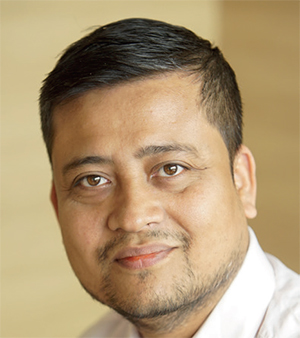What sight means to each one of us is telling of how accessible eye health is to us. To me, it means the opportunity to lead an independent and fulfilled life. To another, it could mean the difference between a bright and dim future. Having a good eyesight opens a world of possibilities to people. Similarly, visual impairment may set one on the vicious cycle of poverty, posing barrier in attaining education and livelihoods, and affecting the psychosocial wellbeing of the individual and their family. There are 9.3 million visually impaired and 270,000 blind children in India. However, over 75 % of all visual impairment can be prevented or treated. Lack of resources and awareness often stands in the way of people availing eye health services and puts them in a predicament even when they need it the most. India houses over 20 % of the world’s blind population and is also home to the largest number of blind children in any one country.
Timely identification and treatment of visual impairment holds the key. The IAPB theme of ‘Love Your Eyes’ reinforces the significance of looking after something so fundamental yet important in chiselling the direction of our lives. It serves as a reminder to look after and invest in ourselves for a healthy and happy life. Ensuring that people get their eyes checked regularly necessitates that people have access to quality eye health services.
Towards this, Orbis has endeavored to touch and transform lives of the communities through the prevention and treatment of blindness. In our journey spanning over two decades, Orbis has been working extensively towards establishing and transforming pediatric ophthalmology as a sub-speciality in India. Over the years, Orbis has established 33 Children’s Eye Care Centers across India, strengthened institutional quality, and supported free/subsidised treatment of children with refractive error and surgical needs. The Refractive Error Among Children (REACH) initiative aimed at reducing visual impairment due to uncorrected refractive error among school-aged children has been instrumental in screening over five million children across the country.
To reach out to the remote and underserved communities, Orbis has also introduced the concept of Green Vision Centers (GVCs) to provide uninterrupted eye care services at vision centers (VCs) in a sustainable and environment-friendly manner. Vision centers are critical to meeting the primary eye care needs of rural communities and strengthening them with solar power makes them super-efficient, providing uninterrupted quality eye care services in the community and making the team more productive. Currently, Orbis has supported setting up of 22 GVCs across the country. Vision vans and door to door screenings have also been deployed as a last mile connect between the communities and eye health services.
The GVCs also standout in their potential to encourage women in the communities to seek eye care, making them more receptive to eye heath messages and counselling advice, and are also creating a cadre of inspired women envisaging eye health as a career option. A unique example of this is of Tamanna, who was trained as a Vision Technician at an Orbis partner hospital and is now leading a GVC in West Bengal. She’d say, “I want to take the learnings I have received as a Vision Technician to greater heights and use my skills to help the people in need; and the possibilities are limitless from here on.”
As a testament to how timely intervention can go a long way in an individual’s life, I’d like to bring up the inspiring story of a young boy Ankush from West Bengal, India. He was born with dense cataract in both eyes and underwent surgery when he was just four months old. His parents sought medical treatment for him at a child eye care facility supported by Orbis after vision defects were observed. This timely action empowered him to lead a normal life. Ankush, 15 years old now, is an aspiring engineer and cricket enthusiast.
Such testaments of change are impetus to us to forge ahead in bridging the gap between the communities and quality eye health services. Prioritizing eye care is a collective effort of various stakeholders, most important of them being the individuals who takes ownership of looking after and loving their eyes by seeking regular eye checkups. In the same spirit, this World Sight Day, I urge everyone to pledge to be a part of the change.


